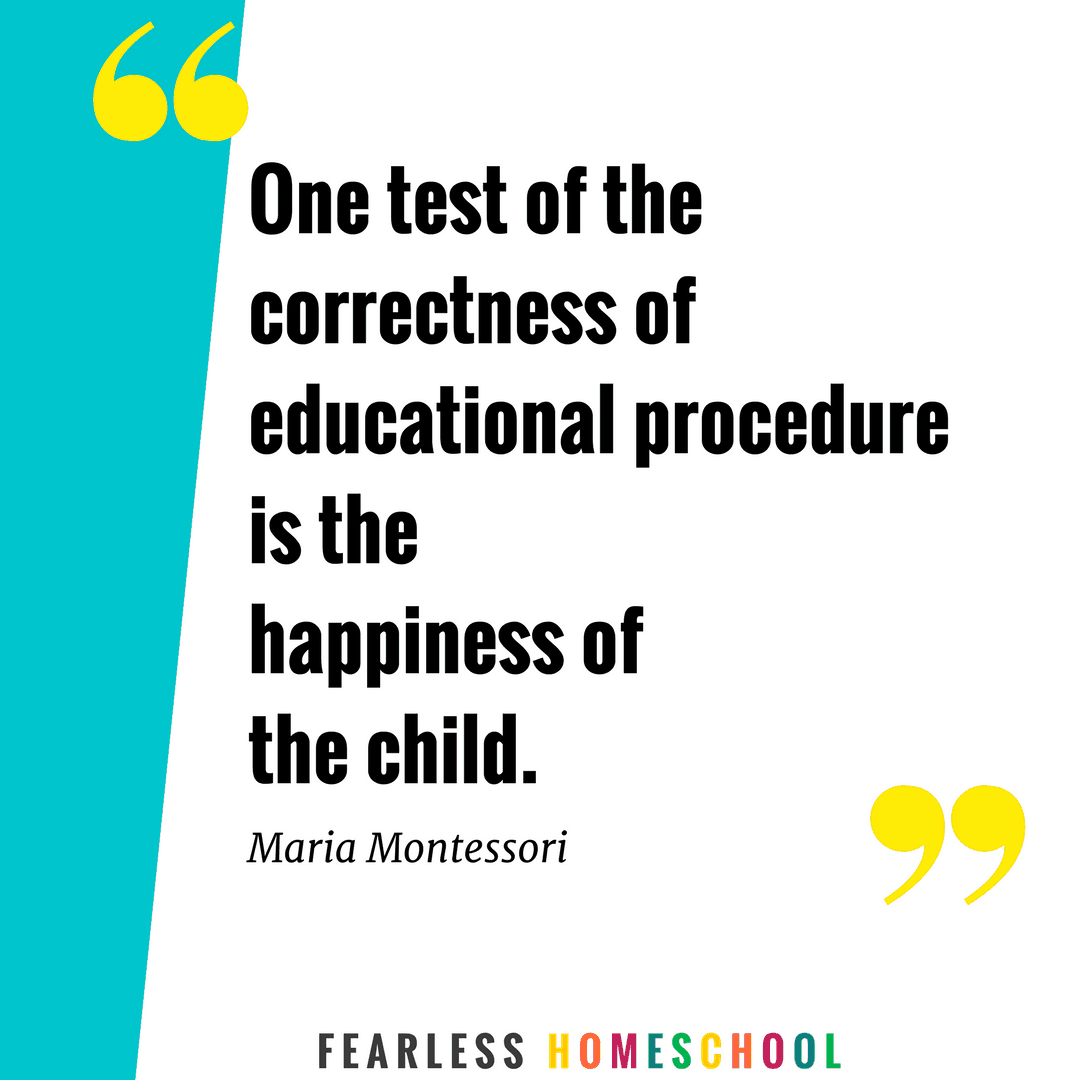
It’s the question that haunts many homeschooling parents – how do I know that I’m doing it right? I’m responsible for the education of my children and there’s no-one and nothing to tell me WHAT to do and WHEN to do it and HOW to do it and argh! It’s enough to cause a meltdown.
To extend the question, without strict curriculum, and standards, and lots of other children to compare to and rank with, how on earth do we homeschoolers know that we’re doing a good job? How do we know this is all going to work out OK in the end?
To put it bluntly, we don’t. We can’t predict the future and know where our current course is taking us. But that’s OK. There’s no guarantee that school will all work out fine and dandy either, and at least we have some control over homeschooling.
However, having control is of no use if you don’t exert it in a useful way. Here’s how to ensure your homeschool will get the results you want.
Prefer to listen instead of reading?
How to know if you’re homeschooling the ‘right way’
If you want to know if something is working, you have to be able to measure it, to have standards to evaluate it against.
Any great end result is built upon thousands of small events that build up day after day. Doing it ‘right’ means knowing what you’re working toward and doing the right type of small steps consistently.
Curriculum standards are school’s solution, but they’re too narrow. Ticking off boxes according to minor skills achieved doesn’t tell us very much. It’s an adequate method for systems that are required to track and measure thousands of students, but we can come up with something much more holistic than that.
Let’s get started.
Use happiness as your measure
People stuck in the school way of thinking are horrified at this goal. “But how will they ever learn anything without unpleasantness? I have to MAKE them!” The assumption is that learning is something that we’ll only do if we’re made to.
But we homeschoolers know better. We know that humans are curious creatures, that learning is something we do naturally. It doesn’t need to forced onto someone – unless it’s boring and irrelevant and the learner has no say in the content or pace (we all know what I’m talking about, right?).

I love this quote from Maria Montessori. People don’t learn when they’re stressed out, bored, or disengaged. I’m still amazed at how much a happy, excited child can learn. They positively gobble up the information, and are able to effortlessly relate it to life and recall it years later.
Ask yourself –
- How happy are my children with their life?
- Do they get excited about what we’re doing?
- How do they describe it to other people?
- Do they laugh a lot?
- Do they freely ask questions?
- Do they actively engage with their activities rather than sit passively?
- Are they sometimes hungry for more activities and more experiences, and sometimes perfectly content to hang out at home?
Use the answers to determine if what you’re doing right now is working.
Also important is your happiness with what is happening. Sometimes, the children are happy but the parent is a bit of a mess. This is usually due to stress – often from wondering if they’re doing it right! The fear of failure, the worry about messing up your children, the stress of having the majority of the responsibility for their education resting on your shoulders can all weigh heavily. It’s necessary to deal with this, because if you don’t you’re communicating that insecurity and anxiety to your children.
Try to separate any anxiety you have from self-assessment and look at the moments – when you can relax, are you content? Do you have lots of lovely little moments with your children that you wish you could freeze? Do you have regular time when you get to do something that you enjoy (everyone else disappearing while you do the dishes doesn’t count)? Do you feel that your family is a team?
If your life is harried and stressed, if there’s shouting and conflict, if your children complain and refuse to do what you think they should, then it’s time to step back and work out how to fix that. Relationships are the base of your entire family life and homeschool experience (take it from Erin, who has over two decades of parenting and homeschooling experience). Make sure they’re relationships you love having.
Be like Bhutan – develop your own Gross National Happiness quotient and get implementing.
Know the reasons you’re homeschooling
Why are you homeschooling? What value have you placed on it?
If you know this, then you have a yardstick to measure success on – are you achieving your reasons why?
Here are some common reasons to homeschool.
- To maintain or repair confidence
- To ensure that they actually learn instead of slipping through the cracks
- To provide a truly individualised education
- To avoid exposure to undesirable behaviour and attitudes modelled at school
- Because you love spending time with them
- To be able to truly support their interests
- To nurture strong family relationships
- To provide you with time / location / activity freedom
- To nurture particular values
- To provide a Christian / Muslim / Jewish etc. centred education
- To allow your children to learn at their own pace and ability; to not be held back or dragged forward
- To protect their health and safety (eg. allergies, removal from bullying)
- You don’t agree with modern educational methods, and want to do something different
- You want to have the joy of witnessing their learning and growth
- To honour bodily needs – ability to sleep, eat, and toilet when needed, not on a schedule
- You want to make sure childhood lasts as long as it is meant to
Once you have your whys, you can ask yourself whether you’re honouring that reason every day.
If you know the values you want to support, are you actively supporting them? Are you modelling them? Do you have systems in place to nurture their growth?
If you want to allow your children to work at their own pace, are they doing that? Do they need more of a challenge, or more time spent on an area to really master it? Or do you still hold ‘age-appropriate’ lists in your head and feel anxiety that you’re not meeting them?
If you love spending time with your children, are you actually spending lots of time with them? Real time, where you’re connecting with them? Or are you getting caught up in chores and other little day-to-day tasks? Or are you continually distracted by your online life, and the pings from your phone?
When your actions are in line with your reasons for homeschooling, it removes conflict in your mind and brings meaningfulness and satisfaction to what you’re doing.

Know your goals
This question is more future focused. Where are you going? In 5 / 10 / 20 years, when you’ve finished homeschooling, what do you hope to have achieved?
This not just academic. We’re holistic educators, so also consider the sorts of values, habits and skills you think are essential for a successful life.
Children should be able to contribute a great deal to this question, especially teenagers – make sure you chat to them about it. After all, it’s their future.
- Academic achievement suitable for x career
- Real social skills
- Ability to x, y, and z (grow vegetables, do everyday maths, ride a unicycle)
- Raise secure, confident children that will grow into secure, confident adults
- Nurture a lifelong passion for self-directed learning
- Have a deep knowledge of self – their abilities, passions, values and goals
- Mastery of everyday life skills
With knowledge of your goals, you have something concrete to work toward.
If your child is feeling insecure you can help to put them into positions where they’ll succeed, and rebuild their self-confidence by praising their hard work and determination.
If you notice that their manners when they answer the phone aren’t up to scratch, you can have a few practice sessions.
If you want them to master everyday tasks, you know that you need to spend lots of time (and patience) cooking with them, showing them how to clean a house, change a tyre, swing a hammer, and whatever else you deem essential.
Want to dig deeper into these steps? Begin Homeschooling with Confidence is a FREE email course that includes writing your homeschooling mission statement.
It can take a great deal of thought and discussion to work out your answers to all of these questions. But once you do you’ll have a rock-solid base for your homeschool, and the ability to notice problems early and know what you need to fix.
When you can see that your family is happy, when your actions are in line with your reasons, and when you can see progress toward your goals, then you KNOW homeschooling is working. It’s a beautiful feeling.

Well said Kelly. I needed the reminder about making sure real
Life aligns with why we have chosen to home educate. Thank you for such a comprehensive response to a great question.
Hi Kirsty,
Thanks so much, i’m glad you enjoyed it. Comprehensive is a much nicer way of saying wordy, isn’t it?
Kelly, I want to thank you for all the support, help and enthusiasm that you bring to homeschooling. Having homeschooled for 13 years, in 4 different states, I was struggling to find new ideas, starting to revert to “school techniques” that were not working at all – defying the reason we chose to homeschool – to encourage our children in their own unique abilities and support their learning journey. You have breathed LIFE back into our classroom/home and for that I am extremely grateful. I just love the Maria Montessori’s quote – thank you for reminding me that not so long ago learning was FUN in our house. I used to tell people that homeschooling our children was like watching the flowers in your garden grow and blossom every day, each one a different coulour and with it’s own unique beauty. I think it is time to start ‘gardening’ again. Keep up tha amazing work. 🙂
Hi Sarnia,
Your comment actually gave me happy shivers. Thankyou so much, comments like this are why I write.
I think it’s really easy to slip back into school mode when we’re overwhelmed – it might be boring but it’s socially accepted and ticking the boxes and working through the books gives us a sense of achievement and structure. The achievement might be fleeting and shallow, but it helps us feel good!
I love your flower analogy, I’m going to remember that one.
Great articel about home schooling. No doubt it is really really important to know what we are doing and are we doing right. Well written, thanks for sharing it.
Wow, amazing article! About to journal my responses to every question you asked. Thank you!
So glad to hear it Gen!
I have just come across this and I am so grateful! Needed this so much!
I homeschool my 3 children and have so many feelings of failure but this has reassured me so much and sparked the excitement I had when I first started homeschooling. Thank you
That’s great to hear Katie, thank you!